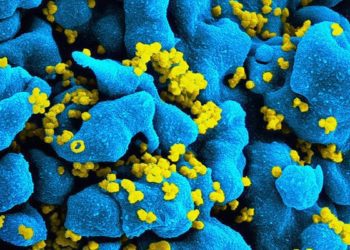Exercise associated with decreased breast cancer risk
Image: PD/NIH
1. Aerobic exercise leads to changes in urinary estrogen metabolites that are known to correlate with decreased breast cancer risk.
2. The association found in this study differs from other exercise intervention studies investigating the effects of aerobic exercise on premenopausal estrogen metabolism.
Evidence Rating Level: 1 (Excellent)
Study Rundown: This randomized controlled trial aimed to determine the effect of aerobic exercise on breast cancer risk. Previous studies that have attempted to analyze this effect have been limited by small size, lack of randomization, and designs that made it impossible to tease apart the effects of exercise and diet. In the WISER study, exercisers experienced a significant increase in urinary 2-OHE1/16a-OHE1 ratio; an increased ratio of these two estrogen metabolites has previously been associated with lower breast cancer risk. This finding therefore constitutes the first clinical evidence that exercise may significantly change estrogen metabolism and consequently decrease breast cancer risk. Given that previous studies have demonstrated conflicting findings surrounding this putative association, further research – ideally in the form of large RCTs – is necessary to corroborate these findings. It is also important to understand the mechanism by which exercise may promote these favorable metabolic changes on a molecular basis, so that breast cancer prevention efforts may focus appropriately on effective interventions (aerobic exercise, increasing lean muscle mass, etc).
Click to read the study in Cancer Epidemiology, Biomarkers, & Prevention
Relevant Reading: Physical exercise and reduced risk of breast cancer in young women
In-Depth [randomized controlled trial]: This trial enrolled healthy, premenopausal women to determine the effects of an exercise intervention on breast cancer biomarkers. Participants in the WISER (Women In Steady Exercise Research) study were randomized into an exercise intervention (n = 212) or no-exercise, usual-lifestyle control group (n = 179). The exercise intervention consisted of 150 minutes of moderate-to-vigorous aerobic exercise per week for 16 weeks. Urine was collected at baseline, midpoint, and at study conclusion, and midfollicular level urinary estrogens (E1, E2, and E3) and their metabolites (2-OHE1, 2-OHE2, 16a-OHE1, 4-OHE1, 4-OHE2, 2-MeOE1, 2-MeOE2, 4-MeOE1, and 4-MeOE2) were analyzed by liquid chromatography/tandem mass spectrometry. Associations between urinary endpoints and measures of body composition, adiposity, fitness, reproductive characteristics, and diet were determined; linear models were calculated to compare urinary endpoints within and between the two groups.
Exercisers experienced a significant increase in urinary 2-OHE1 and 2-OHE1/16a-OHE1 ratio; a non-significant decrease of this ratio was seen in the control group. This is the first exercise-only (rather than exercise-and-diet) intervention study to demonstrate a change in estrogen metabolism. The increased 2-OHE1/16a-OHE1 ratio, observed among exercisers in this study, has been associated with a significantly reduced breast cancer risk in previous human studies.
By Elizabeth Kersten and Andrew Bishara
More from this author: Meta-analysis updates recommendations for C-sections, Early childhood growth improves adult health outcomes in developing countries, Shorter telomere length linked with increased risk of common cold, Breastfeeding associated with lower rates of hypertension, Health information technology improves obesity treatment access and screening, Undervaccination becoming more common, associated with increased admission rates, Silent MIs more common than previously assumed
© 2013 2minutemedicine.com. All rights reserved. No works may be reproduced without written consent from 2minutemedicine.com. Disclaimer: We present factual information directly from peer reviewed medical journals. No post should be construed as medical advice and is not intended as such by the authors or by 2minutemedicine.com. PLEASE SEE A HEALTHCARE PROVIDER IN YOUR AREA IF YOU SEEK MEDICAL ADVICE OF ANY SORT. Content is produced in accordance with fair use copyrights solely and strictly for the purpose of teaching, news and criticism. No benefit, monetary or otherwise, is realized by any participants or the owner of this domain.







